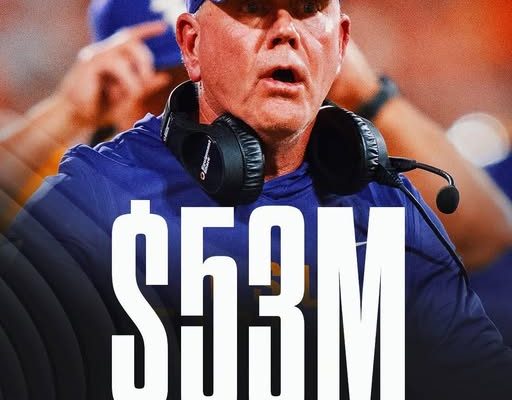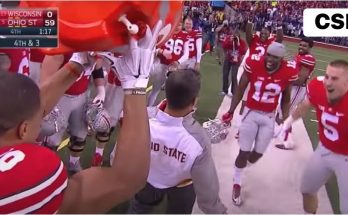Brian Kelly’s sudden dismissal from LSU has sent shockwaves through the college football landscape, not only because of his on-field record but because of the astronomical financial implications tied to his departure. With six years remaining on his original 10-year contract, the buyout agreement represents the second-largest in college football history — a staggering testament to the financial stakes, expectations, and volatility that define the modern era of big-time collegiate athletics. What began as a bold move by LSU to lure Kelly from Notre Dame just a few seasons ago has now ended in a costly divorce, leaving many to question how the program reached this point and what it means for the broader state of college football.
When Brian Kelly arrived in Baton Rouge in 2021, he was heralded as the missing piece to return LSU to national championship glory. The school had just watched Ed Orgeron’s post-title trajectory crumble, and Kelly’s résumé — the winningest active coach in major college football at the time — made him a dream hire. LSU offered him a 10-year deal worth nearly $100 million, making him one of the highest-paid coaches in the sport. The expectations were immense, and Kelly’s confident demeanor only heightened them. In his introductory press conference, he spoke of building a consistent winner, emphasizing culture, accountability, and the championship standard LSU fans demand.
In year one, Kelly delivered a glimpse of that promise. The Tigers shocked the SEC by winning the Western Division, beating Alabama in a thrilling overtime contest that instantly became a defining moment of his early tenure. LSU advanced to the SEC Championship Game, and fans began to believe that Kelly’s disciplined approach was yielding quick dividends. The combination of his offensive system and a revitalized defense appeared to set the foundation for sustained success. But as quickly as optimism rose, cracks began to show beneath the surface.
By the following season, inconsistency plagued LSU. While the offense, led by quarterback Jayden Daniels, put up eye-popping numbers, the defense regressed significantly. Missed tackles, communication breakdowns, and lapses in intensity became recurring themes. Kelly’s sideline composure — once praised as professionalism — began to look like detachment in the face of adversity. When LSU lost crucial games against divisional rivals and failed to meet playoff expectations, the fan base’s patience began to wear thin.
Off the field, there were whispers of internal friction. Reports surfaced suggesting that Kelly’s demanding style and businesslike approach didn’t always mesh with the southern recruiting culture or the personalities within LSU’s athletic department. Some boosters reportedly grew restless, feeling that despite the program’s immense investment, LSU was treading water while rivals like Alabama and Georgia continued to dominate. Recruiting, once the lifeblood of LSU’s success, seemed to lack its usual energy and swagger.
The 2025 season proved to be the breaking point. LSU entered the campaign with high hopes and preseason Top 10 rankings, but an early-season loss set an ominous tone. The Tigers’ performance was marked by inconsistency, and as losses mounted, the once-enthusiastic fan base turned restless. Stadium seats that had been packed with purple and gold faithful began to thin as frustration replaced excitement. Despite Kelly’s insistence that progress was being made, the on-field product didn’t reflect the investment. For a program with LSU’s pedigree and financial muscle, mediocrity was not an option.
The decision to part ways was not just about wins and losses — it was about vision, culture, and the perception that LSU had reached a standstill under Kelly’s leadership. Athletic Director Scott Woodward, known for his aggressive hiring decisions, reportedly felt that a reset was necessary to preserve LSU’s long-term trajectory. But firing a coach with six years left on a guaranteed deal doesn’t come cheap. The university and its boosters now face the monumental task of paying one of the largest buyouts in college football history, a figure that underscores just how all-in LSU was on Kelly’s tenure — and how willing it was to pay dearly for change.
Industry sources estimate that the buyout, including contractual guarantees and negotiated terms, will exceed $70 million. Only one other buyout in college football history has been larger, and few programs in the country could shoulder such a financial hit. It’s a move that speaks volumes about the pressure cooker environment at elite programs, where even a respected, accomplished coach like Kelly can quickly go from savior to scapegoat when championship aspirations are not met.
The buyout also reignites debate about the economics of college sports. Critics argue that these eye-popping figures highlight an unsustainable arms race in coaching salaries and buyouts, where universities pour millions into firing one coach only to pay millions more to hire the next one. At the same time, defenders point out that college football has evolved into a billion-dollar industry, and the pressure to win — and to keep donors, recruits, and fans engaged — justifies the expenditure. For LSU, the financial burden may sting, but in their eyes, maintaining the standard of excellence the program demands is priceless.
Kelly’s firing also raises questions about his legacy and future. His overall record at LSU was respectable, and his offensive development of Jayden Daniels — who went on to become a Heisman Trophy finalist — was a testament to his coaching acumen. Yet in the SEC, good isn’t good enough. The conference is an unforgiving arena where a single down year can erase years of goodwill. Whether Kelly decides to return to coaching remains to be seen, but his reputation as one of the most accomplished program builders in modern college football remains intact. Notre Dame and LSU both owe part of their modern success to his structure and leadership, even if his time in Baton Rouge ended abruptly.
For LSU, the focus now shifts to the future. The coaching search will be intense, and the program will once again be expected to land a marquee name capable of contending for national titles immediately. Names like Lane Kiffin, Mike Norvell, and even rising stars from the NFL ranks have already been floated as potential successors. Whoever takes the job will inherit one of the most talented rosters in the country, backed by one of the most passionate fan bases and one of the deepest pockets in college sports. But they will also inherit immense pressure — the kind that comes with replacing a coach who cost tens of millions just to fire.
Beyond the numbers and headlines, Kelly’s dismissal serves as a cautionary tale for both universities and coaches. In an era where expectations skyrocket overnight, success has become as much about perception and momentum as about actual results. A coach can win ten games and still be deemed inadequate if those victories don’t come in the right moments or against the right rivals. The margin for error at programs like LSU is razor thin, and even a coach with a proven track record like Brian Kelly can find himself out of a job when the championship parade doesn’t materialize.
LSU’s move also underscores how college football’s financial ecosystem has evolved. Television contracts, NIL deals, and booster collectives have flooded the sport with unprecedented money, but that wealth comes with volatility. The willingness to spend tens of millions on buyouts is a reflection of how winning — or the appearance of pursuing winning — drives every decision. Universities are now operating more like professional franchises, balancing short-term optics against long-term stability.
In the end, Brian Kelly’s tenure at LSU will be remembered as a high-stakes experiment that never fully met its potential. He brought discipline, structure, and flashes of brilliance, but the intangible spark that defines championship teams eluded him. His firing — and the massive buyout it triggered — will go down as one of the most expensive reminders of how ruthless college football has become at the top.
For LSU, the message is clear: mediocrity, even when dressed in respectability, is not acceptable. For Brian Kelly, it’s a humbling reminder that success in one powerhouse program doesn’t always translate seamlessly to another. And for the rest of college football, this saga serves as a mirror reflecting the state of the sport — one driven by ambition, fueled by money, and defined by the ever-shrinking patience of fans and administrators alike.
As the dust settles in Baton Rouge, LSU will regroup, retool, and inevitably rise again — it always does. But the echoes of this buyout will linger, serving as both a warning and a testament to the extraordinary costs of chasing glory in the SEC’s unforgiving arena. In the end, Brian Kelly’s story at LSU may be less about failure and more about the impossible expectations that define the modern college football era — where even the second-largest buyout in history can’t put a price on the pursuit of perfection.



